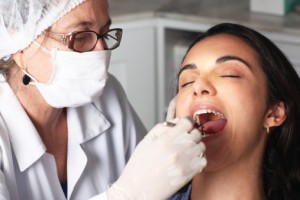Rare is the person who goes through life without a single cavity. (If you know any people this fortunate, we would love to meet them!) Of course, a cavity means a filling, and a filling means—you guessed it—a drill. Or maybe not. Today, we can use air abrasion to remove decay and portions of tooth structure to prepare your tooth for a filling.
Continue reading Air Abrasion
What Can We Learn About Dental Care from Plaque?
 What many dentists know is that plaque is a biofilm, a combination of bacteria (500+ types), fungi, and protozoa, that mixes with nutrients from foods and drinks in the mouth to create a self-sustaining ecosystem. When plaque builds up near the gum line, it creates wounds that are the start of periodontal (gum) disease. What many dentists don’t know is that there are lessons to be learned about dentistry from the vitality of biofilm colonies: treatment should be specialized, treatment should be multidisciplinary, and treatment should be ongoing.
What many dentists know is that plaque is a biofilm, a combination of bacteria (500+ types), fungi, and protozoa, that mixes with nutrients from foods and drinks in the mouth to create a self-sustaining ecosystem. When plaque builds up near the gum line, it creates wounds that are the start of periodontal (gum) disease. What many dentists don’t know is that there are lessons to be learned about dentistry from the vitality of biofilm colonies: treatment should be specialized, treatment should be multidisciplinary, and treatment should be ongoing.
Continue reading What Can We Learn About Dental Care from Plaque?
Do Nice Dentists Finish Last? – Do Dentists Have to be Cruel to be Kind?
 Ever heard the phrase, “you’ve gotta be cruel to be kind?” It has never been truer than when referring to gum disease treatments. Periodontal disease affects as much as 80% of US adults, but the way dental practitioners handle periodontal treatments may be part of the problem. Patients avoid periodontal treatment due to lack of treatment urgency, not fully understanding necessary treatments, and money. Many dentists hesitate to fully explain and recommend periodontal therapy because they fear patients will simply cancel appointments due to the added cost. Instead, dentists tend to try the “nice” approach – recommending periodontal appointments every three months but billing them as regular dental cleanings during six month checkups. However, by changing the focus of periodontal disease treatment to communicating clearly, emphasizing assessment and prevention, and working with patients to maximize insurance benefits, dentists can better equip patients to receive the dental care they need.
Ever heard the phrase, “you’ve gotta be cruel to be kind?” It has never been truer than when referring to gum disease treatments. Periodontal disease affects as much as 80% of US adults, but the way dental practitioners handle periodontal treatments may be part of the problem. Patients avoid periodontal treatment due to lack of treatment urgency, not fully understanding necessary treatments, and money. Many dentists hesitate to fully explain and recommend periodontal therapy because they fear patients will simply cancel appointments due to the added cost. Instead, dentists tend to try the “nice” approach – recommending periodontal appointments every three months but billing them as regular dental cleanings during six month checkups. However, by changing the focus of periodontal disease treatment to communicating clearly, emphasizing assessment and prevention, and working with patients to maximize insurance benefits, dentists can better equip patients to receive the dental care they need.
Continue reading Do Nice Dentists Finish Last? – Do Dentists Have to be Cruel to be Kind?
Ditch The Smoking Habit for Excellent Oral Health
 There are a lot of tobacco users in this country. Whether it’s smoking, dipping, or any other kind of activity, tobacco can leave your mouth, and especially your smile, worse off. Think about it. There are countless carcinogens inside of a single cigarette that can have devastating effects on the appearance of your teeth. Yellow teeth are most often associated with smoking, but your tongue can turn yellow as well. It isn’t just the appearance of your teeth that should be important, your overall health is put into question with each puff. Oral cancer and other ailments are widely associated with tobacco use and for good reason. Gum disease and other ailments can also increase in size and scope when you smoke or dip. Do yourself a favor: stop.
There are a lot of tobacco users in this country. Whether it’s smoking, dipping, or any other kind of activity, tobacco can leave your mouth, and especially your smile, worse off. Think about it. There are countless carcinogens inside of a single cigarette that can have devastating effects on the appearance of your teeth. Yellow teeth are most often associated with smoking, but your tongue can turn yellow as well. It isn’t just the appearance of your teeth that should be important, your overall health is put into question with each puff. Oral cancer and other ailments are widely associated with tobacco use and for good reason. Gum disease and other ailments can also increase in size and scope when you smoke or dip. Do yourself a favor: stop.
Continue reading Ditch The Smoking Habit for Excellent Oral Health
Heed These Helpful Dental Tips Before the Kids Are Back In School
 Your kids have been out of school for a couple months now, but before you know it it’ll be time to ease them into the back-to-school routine. Lost in all the fracas is the time necessary to receive a regular checkup. You were a kid once, what did you do during the summer? You most likely spent your days outdoors with friends getting into trouble and doing who knows what. Now that you’re older, you should understand the importance of a dental checkup, especially for your kids. Who knows what kinds of sugary treats and other goodies they’ve been gorging on for the past couple months. A dental checkup can check for problems and help keep their mouths healthy throughout the school year.
Your kids have been out of school for a couple months now, but before you know it it’ll be time to ease them into the back-to-school routine. Lost in all the fracas is the time necessary to receive a regular checkup. You were a kid once, what did you do during the summer? You most likely spent your days outdoors with friends getting into trouble and doing who knows what. Now that you’re older, you should understand the importance of a dental checkup, especially for your kids. Who knows what kinds of sugary treats and other goodies they’ve been gorging on for the past couple months. A dental checkup can check for problems and help keep their mouths healthy throughout the school year.
Continue reading Heed These Helpful Dental Tips Before the Kids Are Back In School
Caring for Your Smile When You’re Expecting
Are you adding to your family in the near future? Congratulations! This will be an exciting—not to mention busy—time in your life. You’ll have a nursery to decorate, furniture to buy, and plenty of checkups with your doctor.
With everything that’s going on, though, it’s important not to lose sight of your oral health. In fact, regular brushing and flossing will never be as important as they are now. Besides causing symptoms like swollen or bleeding gums, gum disease has also been linked with certain pregnancy complications, like premature birth.
To ensure that your smile stays healthy during your pregnancy, and that your baby stays safe, we recommend the following:
- Clean your smile regularly, paying special attention to your gumline. Gum disease is caused by the accumulation of bacteria and plaque along the gums.
- Enjoy a balanced and nutritious diet. Foods that are processed or sugary will increase your chances of developing gum disease or cavities.
- Talk to your dentists about when to schedule a checkup during your pregnancy. The best time is often during the second trimester.
Like any mom, you want to give your baby the best possible start. With preventive brushing and flossing, you’re already well on your way.
If you have questions about the connection between pregnancy and gum disease, don’t hesitate to talk to your regular family dentist.
Is Sedation Dentistry Right For You?
 Did you know that over 70% of Americans have reported experiencing some level of fear or anxiety when faced with an upcoming appointment at their local dentist’s office? These feelings are understandable, but they can also be dangerous for your oral health. After all, someone who dreads going to the dentist will put off needed appointments, allowing any problems they have to worsen to the point that they require even more time to fix. Thankfully, many practices now offer sedation dentistry, which can help patients relax and feel at ease during their appointment.
Did you know that over 70% of Americans have reported experiencing some level of fear or anxiety when faced with an upcoming appointment at their local dentist’s office? These feelings are understandable, but they can also be dangerous for your oral health. After all, someone who dreads going to the dentist will put off needed appointments, allowing any problems they have to worsen to the point that they require even more time to fix. Thankfully, many practices now offer sedation dentistry, which can help patients relax and feel at ease during their appointment.
If the answer to any of the following questions is “yes,” you may want to talk to your dentist about using sedation dentistry to increase your comfort level at your next visit:
- Does the mere thought of visiting the dentist induce anxiousness, nervousness, or even terror?
- Is it difficult for you to feel comfortable sitting still in a chair for a long period of time?
- Do you have a sensitive gag reflex or constant jaw pain?
- Do the sights, sounds, or smells of the dentist’s office make you feel stressed?
- Are you in need of multiple, lengthy procedures in order to restore your smile to full health?
- Do you struggle with feeling ashamed of your teeth?
There are several kinds of sedation dentistry available for patients. Nitrous oxide (laughing gas) is the mildest type, inducing feelings of warmth and contentment that wear off quickly after the procedure is finished. More severe dental anxiety may be better treated with oral conscious sedation or IV sedation, which helps patients achieve such a deep level of relaxation that they often don’t remember anything about their appointment. Please contact your local dentist to learn what kinds of sedation dentistry they offer and what they recommend for your unique situation.
Eat for Your Best Oral Health
 Did you know that the month of March is National Nutrition Month as designated by The Academy of Nutrition and Dietetics? Everyone knows that diet and nutrition are critical to general health. The fact of the matter is, however, your oral health is equally dependent on and affected by nutrition. Of course there are foods to limit for the sake of your oral health, like those that are loaded with sugar or highly acidic. But there are also foods, specifically certain fruits and vegetables, which are good for your teeth and gums. And with National Nutrition Month upon us, this seems like the time to offer worthwhile tips for your oral health.
Did you know that the month of March is National Nutrition Month as designated by The Academy of Nutrition and Dietetics? Everyone knows that diet and nutrition are critical to general health. The fact of the matter is, however, your oral health is equally dependent on and affected by nutrition. Of course there are foods to limit for the sake of your oral health, like those that are loaded with sugar or highly acidic. But there are also foods, specifically certain fruits and vegetables, which are good for your teeth and gums. And with National Nutrition Month upon us, this seems like the time to offer worthwhile tips for your oral health.
Citrus Fruits
Citrus fruits, such as oranges, pineapples and tomatoes, are chock full of vitamin C, which is critical for the health of your gums. Without enough vitamin C, gums might become unhealthy and even bleed, an early sign of gum disease. Eventually, unhealthy gums may lead to tooth loss, so be sure to include lots of fresh citrus fruits for healthy gums and stable teeth.
Fiber Rich Fruits
When you chew fruits that are high in fiber, salivation increases to help wash away food debris and bacteria that can be harmful to teeth and gums. Some of these fresh fruits are apples, oranges, pears, and watermelons. This increase in saliva reduces the acid level in your mouth and helps avert dry mouth, which makes teeth more vulnerable to decay. In addition, as you chew fiber-rich fruits, you’re also massaging your gums.
Hard Vegetables Build Strong Teeth
Eating hard and fibrous vegetables, such as carrots and celery, provide your body with a good source of beta carotene. Your body needs beta carotene to make vitamin A, which is a nutrient that is vital to building strong teeth. These and other hard vegetables also massage your gums as you chew. And the water content in these vegetables cleans your teeth and gums.
Onions
Onions are great for your oral health, because they contain antibacterial sulfur compounds. These antibacterial compounds help kill the bacteria that can lead to tooth decay and gum disease. And, of course, they are strongest when eaten fresh and uncooked, so be sure to brush your teeth or rinse with a refreshing mouthwash after boosting your oral health with onions!
So, here’s to your health… your oral health!
Understanding Bruxism & TMJ Disorder: Find Relief from Nighttime Teeth Grinding
 Do you often awaken in the morning to find that your jaw is sore or that your neck and shoulders feel tense? Perhaps you suffer from frequent headaches that tend to begin in the area surrounding your temples. These symptoms are common in individuals with nighttime teeth grinding and daily jaw clenching, or bruxism and temporomandibular joint disorder (TMD). Fortunately, treatment for these orofacial issues is typically non-invasive, affordable, and easily accessible at your dentist’s office.
Do you often awaken in the morning to find that your jaw is sore or that your neck and shoulders feel tense? Perhaps you suffer from frequent headaches that tend to begin in the area surrounding your temples. These symptoms are common in individuals with nighttime teeth grinding and daily jaw clenching, or bruxism and temporomandibular joint disorder (TMD). Fortunately, treatment for these orofacial issues is typically non-invasive, affordable, and easily accessible at your dentist’s office.
What Causes Jaw Clenching and Teeth Grinding?
There are a variety of reasons that people with TMD and bruxism engage in the unconscious behavior of teeth grinding and clenching. Malocclusion, or an improper bite, is a major factor, as is daily stress. While you are sleeping, you are not able to stop the overworked muscles in the jaw and face from overtaking themselves further, leading to numerous symptoms that can affect you all day.
For many, the primary complaint related to TMJ disorder is headache pain that interferes with daily functioning. The delicate joints that connect your lower jaw to your cranium can become irritated and inflamed, causing nerve pain that can even spread to your upper back. This can lead to posture problems that further exacerbate the issue. In cases of teeth grinding, the patient is typically unaware that their jaws are placing inordinate amounts of pressure on their teeth all night. Bruxism can cause tooth fractures and enamel erosion, both of which can prove to be serious problems if not treated in a timely manner.
Bruxism & TMJ Treatment
In the majority of cases, a nighttime mouthguard is used to prevent damage to the teeth caused by clenching and grinding. This custom oral appliance fits comfortably in your mouth as you sleep, helping position the jaws properly so that the muscles aren’t unnecessarily strained. Patients who have been clenching their jaws for years are surprised to find that they experience relief from their discomfort in as few as one or two nights with their new appliance.
If you believe that you or someone in your family is suffering with the ill effects of TMJ disorder or bruxism, ask your dentist about a custom oral appliance. Relief could be a phone call away!
Can a Dazzling Smile Improve Your Professional and Social Success?
 A beautiful smile can make a significant difference in your life. That’s why so many patients look for cosmetic help every year. With the care provided by an experienced cosmetic dentist, you can face the people in your life with an improved sense of confidence and wellbeing.
A beautiful smile can make a significant difference in your life. That’s why so many patients look for cosmetic help every year. With the care provided by an experienced cosmetic dentist, you can face the people in your life with an improved sense of confidence and wellbeing.
The most common cosmetic services are:
Teeth Whitening
Teeth whitening is one of the most popular cosmetic services available today. Depending on your needs and your level of sensitivity, your dentist may recommend an in-office whitening solution or a take-home option. Regardless of which you use, both will help you see amazing results.
Porcelain Veneers
Veneers are handcrafted from quality dental porcelain to produce results that look natural and beautiful. Once in place, veneers can help you create a smile that looks straighter and whiter without the need for teeth whitening or braces. A complete veneers procedure is typically completed in two or three visits.
Clear or Invisible Braces
For teens and adults who want a straighter smile but don’t want to wear traditional braces, clear braces can be an excellent alternative. They’re more discreet, allowing patients to maintain their mature and professional image while going through treatment.
Tooth-Colored Fillings
Tooth-colored fillings are used to help patients treat decay, which is among the most common oral health problems. Made from composite fillings, they will blend in with your smile for results that are seamless and durable.
Cosmetic Bonding
Cosmetic bonding is a simple procedure that, similar to porcelain veneers, will help you improve the appearance of a cracked, chipped, or stained tooth. Bonding is a single-visit procedure that takes just a few minutes to complete.
If you’re seeking cosmetic help, your dentist will complete a full oral health assessment before recommending a specific treatment plan. Some patients may need just a single service to achieve the results they want to achieve while others will benefit from a plan that includes multiple services.
Call your local cosmetic dentist to schedule a consultation appointment.
